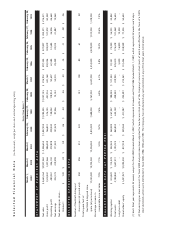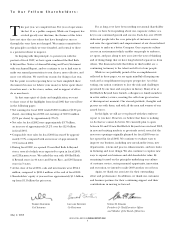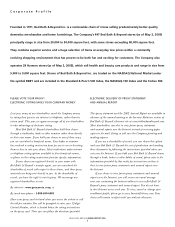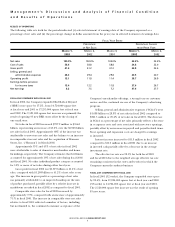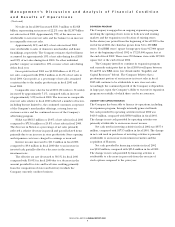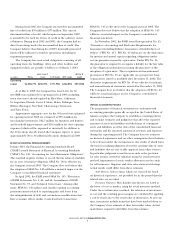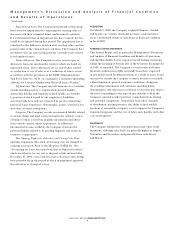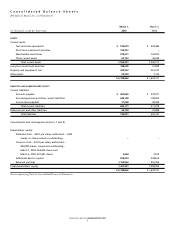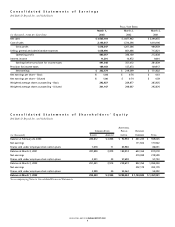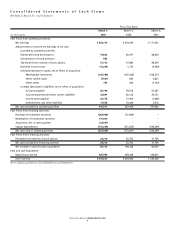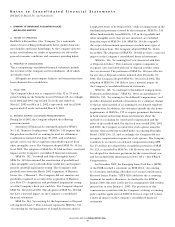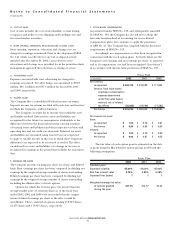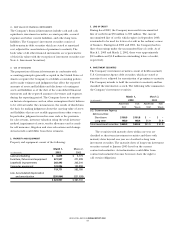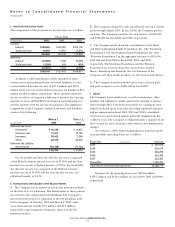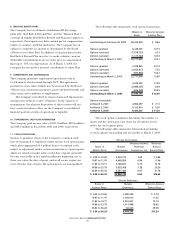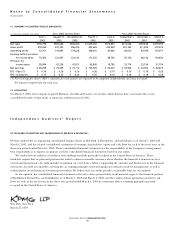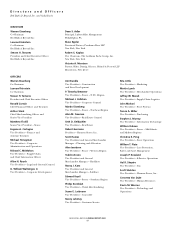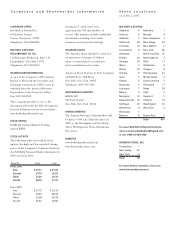Bed, Bath and Beyond 2002 Annual Report Download - page 12
Download and view the complete annual report
Please find page 12 of the 2002 Bed, Bath and Beyond annual report below. You can navigate through the pages in the report by either clicking on the pages listed below, or by using the keyword search tool below to find specific information within the annual report.
BED BATH & BEYOND ANNUAL REPORT 2002
10
Notes to Consolidated Financial Statements
Bed Bath & Beyond Inc. and Subsidiaries
1. SUMMARY OF SIGNIFICANT ACCOUNTING POLICIES
AND RELATED MATTERS
A. NATURE OF OPERATIONS
Bed Bath & Beyond Inc. (the “Company”) is a nationwide
chain of stores selling predominantly better quality domestics
merchandise and home furnishings. As the Company operates
in the retail industry, its results of operations are affected by
general economic conditions and consumer spending habits.
B. PRINCIPLES OF CONSOLIDATION
The accompanying consolidated financial statements include
the accounts of the Company and its subsidiaries, all of which
are wholly owned.
All significant intercompany balances and transactions have
been eliminated in consolidation.
C. FISCAL YEAR
The Company’s fiscal year is comprised of the 52 or 53 week
period ending on the Saturday nearest February 28. Accordingly,
fiscal 2002 and 2001 represented 52 weeks and ended on
March 1, 2003 and March 2, 2002, respectively; and fiscal 2000
represented 53 weeks and ended March 3, 2001.
D. RECENTLY ADOPTED ACCOUNTING PRONOUNCEMENTS
During fiscal 2002, the Company adopted the following
pronouncements:
Statement of Financial Accounting Standards (“SFAS”)
No. 141, “Business Combinations.” SFAS No. 141 requires that
the purchase method of accounting be used for all business
combinations initiated after June 30, 2001, and establishes
specific criteria for the recognition of goodwill separate from
other intangible assets. The Company adopted SFAS No. 141 in
fiscal 2002. The adoption of SFAS No. 141 did not have a material
impact on the Company’s consolidated financial statements.
SFAS No. 142, “Goodwill and Other Intangible Assets.”
SFAS No. 142 discontinued the amortization of goodwill and
other intangible assets with indefinite useful lives and requires
periodic goodwill impairment testing. The Company’s only
goodwill arose from the March 2002 acquisition of Harmon
Stores, Inc. (“Harmon”). The Company did not amortize any
goodwill recognized as a result of the acquisition of Harmon
(see Note 13 – Acquisition) and performed impairment testing
as of the Company’s fiscal year end date. The Company adopted
SFAS No. 142 in fiscal 2002. The adoption of SFAS No. 142 did
not have a material impact on the Company’s consolidated
financial statements.
SFAS No. 144, “Accounting for the Impairment or Disposal
of Long-Lived Assets.” This statement supersedes SFAS No. 121,
“Accounting for the Impairment of Long-Lived Assets and for
Long-Lived Assets to be Disposed Of,” while retaining many of the
fundamental provisions covered by that statement. SFAS No. 144
differs fundamentally from SFAS No. 121 in that goodwill and
other intangible assets, that are not amortized, are excluded
from the scope of SFAS No. 144. SFAS No. 144 also expands
the scope of discontinued operations to include more types of
disposal transactions. The Company adopted SFAS No. 144 in
fiscal 2002. The adoption of SFAS No. 144 did not have a material
impact on the Company’s consolidated financial statements.
SFAS No. 146, “Accounting for Costs Associated with Exit
or Disposal Activities.” This statement requires companies to
recognize costs associated with exit or disposal activities when
they are incurred. The provisions of SFAS No. 146 were effective
for any exit or disposal activities initiated after December 31,
2002. The Company adopted SFAS No. 146 in fiscal 2002. The
adoption of SFAS No. 146 did not have a material impact on
the Company’s consolidated financial statements.
SFAS No. 148, “Accounting for Stock-Based Compensation-
Transition and Disclosure.” SFAS No. 148 is an amendment of
SFAS No. 123, “Accounting for Stock-Based Compensation,” and
provides alternative methods of transition for a voluntary change
to the fair value method of accounting for stock-based employee
compensation. In addition, the statement amends the disclosure
requirements of SFAS No. 123 to require prominent disclosures
in both annual and interim financial statements about the
method of accounting for stock-based compensation and the
effect of the method used. For the fiscal years ended 2002, 2001
and 2000, the Company accounted for stock options using the
intrinsic value method prescribed under Accounting Principles
Board (“APB”) No. 25, and accordingly, the Company did not
recognize compensation expense for stock options. The Company
continues to account for stock-based compensation using APB
No. 25 and has not adopted the recognition provisions of SFAS
No. 123, as amended by SFAS No. 148. However, the Company
has adopted the disclosure provisions for the current fiscal year
and has included this information in Note 1(T.) – Stock-Based
Compensation.
In November 2002, the Emerging Issues Task Force (EITF)
of the FASB reached a consensus on EITF 02-16, “Accounting
by a Customer (including a Reseller) for Certain Consideration
Received from a Vendor.” EITF 02-16 addresses the accounting
treatment for vendor allowances. As clarified by the EITF in
January 2003, this issue is effective for arrangements with vendors
initiated on or after January 1, 2003. The provisions of this
consensus are consistent with the Company’s existing accounting
policy and the application of EITF 02-16 is not expected to have
a material impact on the Company’s consolidated financial
statements.


